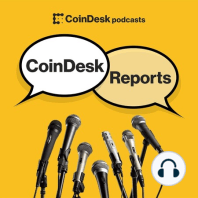24 min listen
ETH2.0: Ethereum’s Transition Could Be Months Not Years, Away
FromCoinDesk Reports
ratings:
Length:
33 minutes
Released:
Mar 25, 2021
Format:
Podcast episode
Description
In this week’s episode, CoinDesk’s Christine Kim and Will Foxley, along with Consensys’ Ben Edgington, discuss the latest proposals fast-tracking Ethereum’s transition to a proof-of-stake (PoS) consensus protocol. The promises of Ethereum 2.0 are changing in important ways. On Thursday, March 11, Ethereum founder Vitalik Buterin published a blog post detailing how the network’s transition from a proof-of-work (PoW) consensus protocol to PoS could be executed far more quickly than developers had originally planned. “It would leave a lot of loose ends that we’d have to work on and tidy up later, but it’s looking like this [transition] could be months rather than years [away],” said Edgington. There are several reasons why a move to PoS in the near term, rather than long term, looks attractive in the eyes of Ethereum developers. First, it would mean the resistance from proponents of the Ethereum miner community towards reductions in block reward through Ethereum Improvement Proposal 1559 and changes to the network’s consensus algorithm would be short-lived. With a PoS upgrade, miners would effectively be forked from the Ethereum protocol entirely and replaced with other network stakeholders known as “validators.” Second, Edgington noted there’s been “a big backlash” about the environmental impact of Ethereum’s PoW algorithm securing the value of several high-profile non-fungible tokens (NFTs). As the value on Ethereum grows through decentralized applications (dapps) and tokens, there is greater pressure to reduce the energy consumption of the underlying protocol and reduce the network’s environmental footprint through a switch to PoS. At the same time, there are equally important reasons why a move to PoS in the near term could negatively impact Ethereum. First, the process for coming to an agreement about the development roadmap and timeline for Eth 2.0 has been restricted to a comparatively small group of developers and researchers. Moving forward with a transition to PoS now would mean all decisions are made with a much larger community of network stakeholders and through a more complicated process of governance. This is likely to slow research and development for other innovative aspects of Eth 2.0 – namely, the scalability promises of this multi-year upgrade. The second reason for resisting a move to PoS for Ethereum in the near future is that in order to do so, core features and functionalities initially envisioned for the protocol would need to be delayed. For example, sharding, which is the primary scaling solution for Ethereum on a protocol layer, would have to wait in order for an Eth 2.0 transition to happen posthaste. Are protocol developers giving up too much of the grand vision originally outlined for Eth 2.0 in favor of a quick fix solution to PoS? Listen to the full podcast to hear from Kim, Foxley and Edgington on what’s at stake for Eth 2.0. Links mentioned in this podcast: What’s New In Eth2 (www.eth2.news) Valid Points (https://www.coindesk.com/newsletter/valid-points) See Privacy Policy at https://art19.com/privacy and California Privacy Notice at https://art19.com/privacy#do-not-sell-my-info.
Released:
Mar 25, 2021
Format:
Podcast episode
Titles in the series (100)
OPINIONATED: 'Where Banks Go, Regulation Follows.' Why Institutional Acceptance Is a Double-Edged Sword For Crypto – Feat. Ajit Tripathi by CoinDesk Reports
